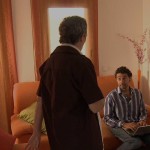Estoy agotado
Michael doesn’t feel well. He thinks he has a fever. Eva looks for the reasons…
In this episode you will learn: how to express how do you feel in Spanish, to express your mood in Spanish, to look for the causes in Spanish, to express symptoms in Spanish.
MICHAEL: Disculpa, ¿puedes bajar un poquito el volumen?
EVA: Claro… ¿Te ocurre algo?
MICHAEL: Estoy muy cansado. Demasiado.
EVA: Quizás ayer hiciste un sobreesfuerzo.
MICHAEL: ¡Qué va! ¡Si fue un día normal! No sé, estoy muy fatigado. No puedo con mi alma.
EVA: Los años.
MICHAEL: Quizás. Oye, ¿y si estoy enfermo?
EVA: No digas tonterías. A ver, ¿qué síntomas tienes?
MICHAEL: Pues me duelen las articulaciones, las piernas sobretodo. Y me duele la cabeza. ¿Y si tengo fiebre?
EVA: Yo ya sé lo que te pasa.
MICHAEL: ¿Ah sí?
EVA: A eso se le llama resaca. Y pasados los treinta pueden ser muy peligrosas.
MICHAEL: ¡Pero si hago lo mismo de siempre!. Me levanto por la mañana, voy a trabajar, ceno… tomo unas copitas…
EVA: Pues eso, que haces lo mismo de siempre. Pero ahora eres más mayor.
MICHAEL: ¡Anda ya!
EVA: Además, sólo cuerpos realmente preparados pueden soportar tanto ‘glamour’.
MICHAEL: ¡Ay!
EVA: ¡Michael!
MICHAEL: Excuse me, can you turn down the volume?
EVA: Sure … Are you alright?
MICHAEL: I’m very tired. Too tired.
EVA: Perhaps you over strained yourself yesterday.
MICHAEL: Absolutely not! It was a normal day! I don’t know, I am exhausted. “I can’t stand it”.
EVA: Age.
MICHAEL: Maybe. Hey, what if I’m sick?
EVA: Don’t say nonsense. Let’s see, what symptoms do have?
MICHAEL: Well, I’ve got a pain in my joints, especially in my legs. And I’ve got a headache. What if I have a fever?
EVA: I know what’s happening.
MICHAEL: Ah yes?
EVA: It’s called a hangover. And after thirty it can be very dangerous.
MICHAEL: But I always do the same thing! I get up in the morning. I go to work. I have dinner … I have some drinks…
EVA: Well, that’s it, you do the same things as always. But now you’re older.
MICHAEL: Come on!
EVA: Besides, only very fit bodies can withstand so much ‘glamour’.
MICHAEL: Ay!
EVA: Michael!
¿Puedes bajar el volumen, por favor?
Can you turn down the volume, please?
BAJAR, has more meanings, in this case it is to turn down the sound, voice… But it also means to go down; for example to go down stairs, in Spanish Bajar la escalera. The opposite in both senses is SUBIR.
¿Te ocurre algo?
Are you alright?
In this case OCURRIR, means the same as ¿Te pasa algo?. OCURRIR or PASAR, mean the same, for example when we ask ¿Qué pasa? What happens?, we are asking for an action, a general or personal problem.
No puedo con mi alma.
I have no energy left. I can’t stand it.
This is an expression which means that I am so tired that I have no energy to do anything, literally means that I have no energy even to stand my soul. This is very popular in Spanish from Spain.
Me duelen las articulaciones.
My joints hurt.
DOLER; this is an special verb as it has only two forms: DUELE, DUELEN and it needs pronouns: ME DUELE(N), TE DUELE(N), LE DUELE(N), NOS DUELE(N), OS DUELE (N), LES DUELE(N).
¡Anda ya!
Come on!
This is an expression we use when we don’t accept a critic. For example, in this chapter Michael doesn’t believe Eva when she says that he is getting old and shouldn’t do the same things as he used to do. It will be similar to say: DON’T BE SILLY!


